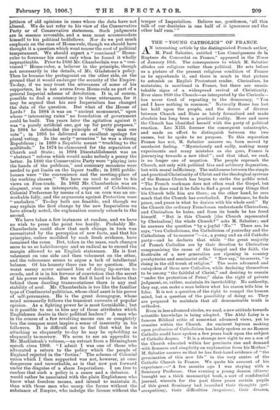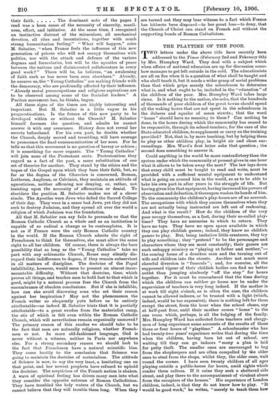THE " YOUNG CATHOLICS " OF FRANCE.
AN interesting article by the distinguished French author, M. Paul Sabatier, entitled "Les Consequences de in Rupture du Concordat en France," appeared in the Times of January 18th. The consequences to which M. Sabatier alludes are religious rather than political. He sets before us a picture of the present religious condition of France as be apprehends it, and there is much in that picture to astonish an English Protestant reader. Clericalism, be maintains, is moribund in France, but there are unmis- takable signs of a widespread revival of Christianity. Ever since 1860 the Church—as interpreted by the Clericals— has never tired of repeating to the democracy, " You and I have nothing in common." Naturally Rome has lost her hold upon the people, and the decree of divorce between Church and State so lately formalised and made absolute has long been a practical reality. More and more the Church has identified herself with the party of political reaction. Leo XIII. foresaw the consequent catastrophe, and made an effort to distinguish between the two causes, but he spoke to no purpose. To this separation France has not, M. Sabatier assures us, been moved by secularist feeling. "Mysteriously and sadly, making many experiments and many mistakes as she goes, France is journeying towards a new ideal " ; and that ideal, we read, is no longer one of negation. The people reproach the Church, not only with political bias and arbitrary dogmatism, but with moral inefficiency. The unlikeness between the simple and practical Christianity of Christ and the theological systems of the Roman Church has begun to strike the public mind. " The French workman does not often read the Gospel, but when he does read it he fails to find a great many things that his Church tells him are there; on the other hand, he sees much that the Church has overlooked. For instance, he finds peace, and peace is what he desires with his whole soul." By the Church the ordinary Frenchman understands Clericalism, and Clericalism he hates, and from its bonds he has freed himself. "But is this Church [the Church represented by Clericalism] the whole Church ? " asks M. Sabatier ; and he answers the question "by a joyful No.' " There are, he says, "two Catholicisms, the Catholicism of yesterday and the Catholicism of to-morrow "—i.e., a young and an old Catholic, party—and he declares that while " the great majority of French Catholics are by their devotion to Clericalism compromising the cause of the Gospel and the faith, the firstfruits of a new generation are ripening in country presbyteries and seminarist cells." " New sap," he asserts, " is rising in the old trunk of religion." The more advanced and outspoken of these new Catholics, while declaring themselves to be among "the faithful of Christ," and desiring to remain " under the protection of Peter," claim the right of private judgment, or, rather, maintain its inevitability. No authority, they say, can make a man believe what his reason tells him is false. It is not a question of the right to compel the human mind, but a question of the possibility of doing so. They are prepared to maintain that all demonstrable truth is orthodox.
Even in less advanced circles, we read, a new attitude towards scientific knowledge is being adopted. The Abbe Loisy is a famous Biblical critic of somewhat advanced views, yet he remains within the Church. An eminent layman making open profession of Catholicism has lately spoken as no Roman Catholic could have spoken a few years back upon the subject of Catholic dogma. " It is a strange new sight to see a son of the Church educated within her precincts rise and demand with firmness and simplicity an explanation from his Mother." M. Sabatier assures us that be has first-band evidence of " the germination of this new life" in the very centre of the Catholic Church in France. We quote hie account of his experience :—" A few months ago I was staying with a Seminary Professor. One evening a young deacon (diacre) brought me a thick manuscript book, a sort of confidential journal, wherein for the past three years certain pupils of this great Seminary had inscribed their thoughts (pl.& occupations), their difficulties (anyoisses), their dreams,
their faith The dominant note of the pages I
read was a keen sense of the necessity of sincerity, manli- ness, effort, and initiative. At the same time, I recognised an instinctive distrust of the miraculous, all mechanical devotion, all rites and incantations, together with much strong humanitarian feeling." " What will happen," cries M. Sabatier, " when France feels the influence of this new generation of priests who will not occupy themselves with politics, nor with the attack and defence of the various dogmas and formularies, but will be the apostles of peace between the nations and disinterested collaborators in every good work ? " There will be, he believes, "an awakening of faith such as has never been seen elsewhere." Already, he assures us, the " Young Catholics " are making friends with the democracy, who are profoundly affected by their influence. "Already moral preoccupations and religious aspirations are to be observed among some of the Socialist leaders." A Puritan movement has, he thinks, begun.
All these signs of the times are highly interesting and important. But M. Sabatier is a little vague in his prognostications. Is the future of this new party to be developed within or without the Church? M. Sabatier himself foresees the question, and admits he cannot answer it with any assurance. History does not reveal her secrets beforehand. For his own part, he doubts whether the Church, deeply moved and trembling, will have courage to pronounce the final excommunication of her sons. For he tells us that this movement is no question of heresy or schism ; it is something far more organic. The " Young Catholics" will join none of the Protestant sects. Protestantism they regard as a fact of the past, a mere substitution of one set of theories for another. They stand by the ethics and the hopes of the Gospel upon which they base their faith, but, so far as the dogma of the Churches is concerned, Roman, Lutheran, Anglican, or Calvinist, they maintain an attitude of agnosticism, neither affirming nor denying, or, rather, not insisting upon the necessity of affirmation or denial. To elucidate the position M. Sabatier makes use of a clever simile. The Apostles were Jews who defied the Sacred College of their day. They were in a sense bad Jews, yet they did not seek to destroy Judaism, and they spread all over the world a religion of which Judaism was the foundation.
All that M. Sabatier can say fails to persuade us that the Roman Catholic Church as a whole and as an institution is capable of so radical a change as he contemplates. It is not as if France were the only Roman Catholic country in the world. If the Roman Church admits the right of Frenchmen to think for themselves, she must allow the same right to all her children. Of course, there is always the bare possibility that so long as the "Young Catholics" take no part with any schismatic Church, Rome may silently dis- regard their indifference to dogma, if they remain subservient in all matters of discipline. The doctrine of the Papal infallibility, however, would seem to present an almost insur- mountable difficulty. Without that doctrine, time, which proves all things, and teaches men to hold fast to that which is good, might by a natural process free the Church from the encumbrance of obsolete conclusions. But if she is infallible, how can she avoid disowning sons who set their reason against her inspiration P May not the phenomenon the French writer so eloquently puts before us be entirely attributable—as indeed M. Sabatier hints that it is partially attributable—to a great exodus from the materialist camp, the stir of which is felt even within the Roman Catholic Church, which will nevertheless remain organically unmoved? The primary reason of this exodus we should take to be the fact that men are naturally religious, whether French- men or not. In more old-fashioned language, God is never without a witness, neither in Paris nor anywhere else. For a strong secondary reason we should look to the fact that Frenchmen have a natural scientific bias. They came hastily to the conclusion that Science was going to maintain the doctrine of materialism. The attitude of Science is now, to say the very least, a hesitating one on that point, and her newest prophets have refused to uphold the doctrine. The scepticism of the French nation is shaken. A wave of spiritual feeling has driven many men into what they consider the opposite extreme of Roman Catholicism. They have troubled the holy waters of the Church, but we cannot believe that they will trouble them long. When they are turned out they may bear witness to •a fact which France has hitherto been disposed—to her great loss—to deny, that the Church of Christ can stand on French soil without the supporting bonds of Roman Catholicism.











































 Previous page
Previous page